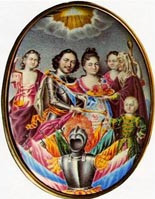
Peter I issued a decree on succession to the throne
On February 5 (16), 1722 Peter the Great issued a decree on succession to the throne. Under the decree the head of state could appoint his successor using his own discretion: ‘…so that the governing sovereign could pass his power to the one he prefers, and in order that all our loyal subjects, religious and civilian, with no exception, approve of our decree in front of God and His Gospel on the ground that anyone who would be against it or will interpret it differently, would be considered a traitor and exposed to the death penalty and a religious oath’.
The decree destroyed the age-old principles of handing down the power from father to son. Henceforth a sovereign could appoint his heir anyone he wished without observing the birthright if he believed that his older son was not good for ruling a country. In August of 1722 was published a book by Feofan Prokopovich ‘The truth of a monarch’s will’ where he explained and substantiated the emperor’s right to make arrangements for the future of the state: ‘The way a father can disinherit a son, a monarch can deprive his son of the throne’. Feofan reserved for people the right to participate in the assignment, but only in cases when there was no direct will of a sovereign. However Feofan did not propose any scheme for such participation.
The Russian practice in the 18th century had demonstrated that under the conditions of the absolute monarchy, when the emperor’s personality had a great meaning such a way of succession to the throne undermined the stability of governance and often provoked palace revolutions. That is why Paul I on the day of his coronation, on April 5 (16), 1797 signed a decree on succession to the throne abolishing the decree of Peter the Great. The new law initiated the guaranteed passing of the emperor’s power from father to son. Putting the law on succession to the throne above the monarch’s will Paul I expressed his faith in God’s will, not in a man as Peter did. Thus the succession of monarchy power once again became independent from the impact and wishes of the ruling class though it did not secure from plots.
Lit.: Зызыкин М. В. Царская власть и Закон о престолонаследии в России. София, 1924; Корево Н. Н. Императорский всероссийский Престол. Наследование Престола по Основным государственным законам. М., 2000, 2001; Мавлиханова Е. Первоначальник Саровской пустыни Иоанн: трагедия эпохи барокко // Человек в культуре русского барокко. Материалы международной конференции. М., 2006; Феофан (Прокопович). Правда воли монаршей. СПб., 1722.
Based on the Presidential Library’s materials:
Peter I (1672–1725): [digital collection];
Полное собрание законов Российской империи, с 1649 года. СПб., 1830. Т. 6. № 3893;
Полное собрание законов Российской империи, с 1649 года. СПб., 1830. Т. 24. № 17910.

